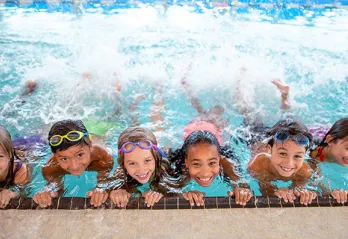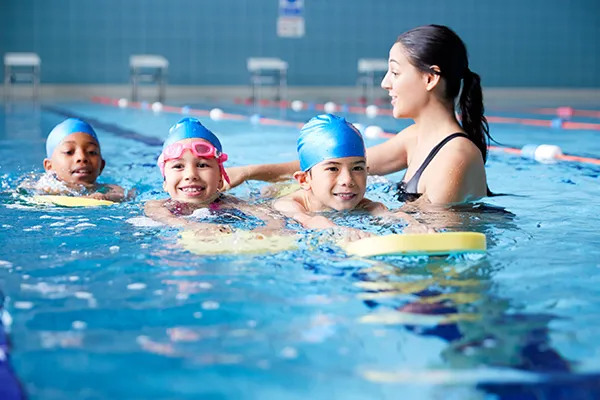4 Reasons Why Swim Lessons Are a Year-Round Commitment

In the summer, swimming is a staple activity for all ages. Because of that, it’s an especially common time for families to enroll their kids in swim lessons.
But why do swim lessons seem to stop when summer ends?
Swimming isn’t just a fun skill to learn — it’s essential. It’s lifesaving. And learning to do it properly takes practice and commitment not just from kids but from parents. Year-round, weekly swim lessons are something every family should make a part of their routine.
Warning: This blog offers some hard truths about parent expectations. But trust me, I’ve been a swim instructor for more than 10 years, and I’ve taught countless children how to successfully swim.
Muscle Memory Matters
Activities, like walking, running, jumping and balancing, tend to use a lot of the same movements while performing similar tasks. However, swimming uses a whole different set of movements that cannot be practiced anywhere but in a pool.
Important swimming skills — think blowing bubbles, submerging, floating, kicking and pulling — need to be practiced repeatedly to develop muscle memory and a feel for the water. Unfortunately, attempting to practice these skills in the bathtub at home just won’t cut it. Participation in year-round, weekly swim lessons will allow kids to practice these essential skills regularly and quickly develop muscle memory for them.
Get Comfortable
For a young child just learning to swim, the pool can be a scary place. It’s big, it’s wet, it’s cold, it’s deep. Maybe they have water in their eyes, nose or ears. Maybe they’re wearing a swimsuit for the first time. Or working closely with a new person (a swim instructor) who they’re not used to.
Let’s face it, tears can be normal during swim lessons.
However, all of these fears and unknowns can be lessened with more exposure to the pool. Each time that you take a break from swimming and come back to the pool months later, you are reintroducing them to this unfamiliar and possibly scary environment. By continually taking your kids to the pool for swim lessons, they’ll get used to the pool environment, being in the water and working with an instructor and that will benefit them as they continue to learn and grow.
Repeat After Me
Think about the last time you learned a new, difficult skill. Did you learn some parts of it, take a few months off, and then resume and expect to pick up right where you left off? Probably not.
Think about other skills a child learns, like reading. They don’t “sort of” learn how to read, take a year off from trying, and then pick it up again at the same level they were reading when they started. Chances are, they’re back at the beginning. Swimming is no different. Kids need repeated exposure to the skills over long, continuous periods of time before they really learn the skills.
And that repetition pays off. Participation in formal swim lessons can reduce the chance of drowning for little ones by as much as 88 percent.
Patience is Best
As a parent, the best thing you can do for your child is to be patient as they learn how to swim and accept that learning how to swim is a long-term commitment.
I hate to break it to you, but no child is going to learn how to swim in a month of group swim lessons, or after you purchase an eight pack of private lessons.
As a long time swim instructor and swim coach, one of the most common questions I get from parents is, “When will they be water safe?” That’s a question that I can’t answer. There is no right answer for how long it will take. A lot depends on their willingness to learn and try.
You can support their efforts by encouraging them to do their best, to try new things and to be consistent. They may go through ups and downs or their progress may stall at times, but that’s OK. Encourage them to keep at it. It will pay off in the long run to be consistent and continue learning and practicing.
Emily Sampl is the marketing coordinator for the YMCA of Northern Colorado and a long-time swim instructor and coach. You can learn more about swim lessons at ymcanoco.org/aquatics.

